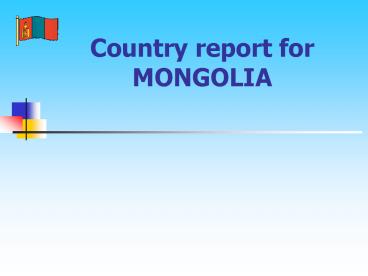Country report for MONGOLIA - PowerPoint PPT Presentation
1 / 16
Title:
Country report for MONGOLIA
Description:
Country report for. MONGOLIA. Geographical location. Locations: between China and Russia; ... Statistical Office (NSO), Mongolia's official statistical agency, ... – PowerPoint PPT presentation
Number of Views:752
Avg rating:3.0/5.0
Title: Country report for MONGOLIA
1
Country report forMONGOLIA
2
Geographical location
Locations between China and Russia
Territory 1.566 thous sq. km Land boundaries 8,
158 km, with Russia 3,485 km with China 4,673
km Average altitude 1,580 m above sea-level Tem
peratures in the winter -15 C and -40 C, in the
summer 10 C and 35 C, Precipitation in the pl
ains and mountains 380 mm, in the desert and
Gobi areas 125 mm
3
State structure administratively divided into 21
aimags (provinces) Ca
pital city Ulaanbaatar Population 2.5 millio
n Density 1.6 persons per sq. km Sex ratio a
t births 105 males per 100 females
Life expectancy male 61 years, female 66 years
Ethnic group Mongols (Khalkha) 86, Kazaks 6,
Others 8 Religions Tibetan Buddhism 96, Musli
m, Christian and Shamanism 4 Languages Mongolia
n National currency Tugrik (MNT), about MNT 1,20
0USD 1 in Sep,2004
4
Key statistics
NUMBER OF LIVESTOCK /thous.heads/
Total 28027.9 Camel 256.6 Horse 2005.3
Cattle 1841.6 Sheep 11686.4 Goat 12238.0
5
GROSS AGRICULTURAL OUTPUT IN 2004
6
Our statistical system
- Mongolian statistics can be regarded as a mixture
of a centralized and decentralized system - NSO is an independent agency
- The parliament appoints the chairman
- The chairman reports his activities to the
parliament
7
Institutional aspect
- The National Statistical Office (NSO), Mongolias
official statistical agency, is to provide
national and international users with high
quality, complete and reliable statistics. This
includes responsibility for the development of
concepts definitions, and classifications to be
used by all Mongolian public agencies that play
role in the official statistics.
8
Structure of statistical system
9
Main functions of the NSO
- To collect, compile and analyze the fundamental
statistics - To co-ordinate with government agencies while
receiving statistical information from various
ministries and agencies - To introduce international standards and
methodologies - To conduct population and housing census every
10 years - To conduct sample surveys and thematic studies
- To capture all entities in recording of business
registers - To improve the data dissemination system and
services - To monitor the accuracy of official statistics
- To co-operate with international organizations
and other national statistical services
10
Structure of the NSO
Controlling, Monitoring and Local Administration
Division
I work here
11
- Statistical planning and police coordination
department - consists of 3 divisions.
- Statistical integrated policy division is in
charge of the implementation of 1993 SNA, GDP
estimation, compilation of national accounts,
supply use table, input and output tables,
development of methodologies and conduct of
related surveys, collecting and processing
related data at Macro level. The department is
also responsible for bridging the methodology
with international standards as well as carrying
out surveys. responsible for developing the
social statistics system and produces all
statistics relevant to society. - Population and Social Statistics Division is
responsible for developing the social statistics
system and produces all statistics relevant to
society. The Social Statistics Division is also
responsible for Gender statistics and produces
all statistics relevant to population, conducts
the population and housing census. - Economic statistics division is responsible for
developing the business statistics system and
produces all statistics relevant to
manufacturing, agriculture, construction,
customs, trade, communication and transport.
12
Problems, issues and contraints encoutred in
moving the statistical system towards market
economy.
- During transition period, NSO has been facing the
following problems - Due to the transition to the market economy,
modifications in methodology for determining of
economics and social development indicators were
found to be necessary. After 1990, the estate
owned farms have been disbanded and have since
been privatized. The ownership of livestock and
agriculture farms are now in the hand of private
households. Because of this situation, it is
becoming necessary to change the agricultural
statistical system. - There has been reducing number of staff entire
system of the statistical organization. Now, only
two persons are responsible for agriculture
sector statistics in NSO. - There is also has been facing shortage of the
budget. Due to lack of the money NSO can not
conduct sample surveys on sectors. There is more
staff training needed for elaborating methodology.
13
Statistical census
- Population and housing census - every 10
years - Livestock census including of domestic animals -
every year - Census of establishments - every 5 year
- Sown area census (2004 )
14
Statistical survey
- Survey of input-output table - every 5 year
- Sample survey of consumer price index - every
month - Household income and expenditure survey -
every quarter - Living standard measurement survey - every 3
year - Special sample survey
- - Children and Development survey (1996, 2000)
- - Time use survey (2000)
- - Informal sector survey (1997, 2000)
- - Reproductive Health survey (1998, 2000)
- -Crop yield survey (2004 )
- -Agricultural sample survey and economic accounts
(1998-1999)
15
- Dissemination activities
- Statistical information is disseminated in the
following ways - -Annual Statistical Yearbook
- -Monthly Statistical Bulletin
- -Special Publications
- -Electronic information service
- -Mass media
16
Future plan
- A Corporate Strategic Plan 2004-2010 of the NSO
was elaborated under the financial and technical
assistance of World Bank. In the framework of
STAT 6 project, the NSO also developed a new
Business strategy plan covering the years
2005-2010. Now we have prepared a programme of
official statistics development in 2005-2010 and
going to summit it to the Parliament - There is included agriculture sample survey in
Strategic Plan 2004-2010































